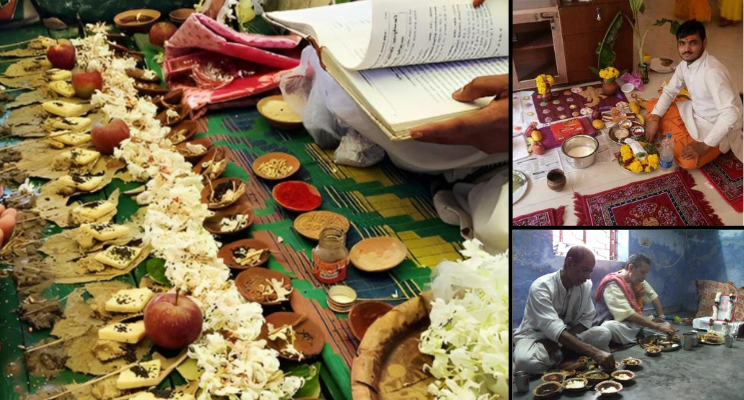Losing a father is one of the most emotionally profound experiences in a person’s life. In Hindu culture, this grief is supported and expressed through a series of sacred rituals that offer spiritual closure, peace for the departed soul, and emotional strength for the family. These post-death rituals hold deep religious and cultural significance, reflecting thousands of years of tradition and belief in karma, rebirth, and moksha (liberation).
1. Antyesti (Last Rites)
Antyesti, or the last rites, mark the final sacrament (samskara) in a Hindu’s life. It involves cremation of the body, which is considered essential to release the soul (atma) from its earthly existence. The eldest son usually performs the rites, including lighting the funeral pyre and breaking an earthen pot to symbolize the severance of ties.
2. Pind Daan and Tarpan
Pind Daan is the offering of rice balls and sesame seeds to help nourish and guide the soul in its journey through the afterlife. Tarpan is a ritual where water mixed with sesame seeds is offered to appease the ancestors. These are usually performed on the banks of sacred rivers like Ganga, symbolizing purification and connection with the divine.
3. 10-Day and 13-Day Rituals (Dashah and Terahvin)
The family observes a mourning period, typically for 10 or 13 days, depending on regional customs. During this time:
- The family refrains from festivals and auspicious activities.
- Priests guide daily rituals and chanting of sacred mantras.
- Brahmins are fed and given dakshina (donation), which is believed to help earn good karma for the departed.
4. Shraddha Ceremony
Performed monthly and annually, the Shraddha ceremony is a memorial service to pay homage to the father. Offerings of food and prayers are made to support the soul’s journey and maintain ancestral blessings on the family. It is a key way of maintaining pitru rin (ancestral debt).
5. Asthi Visarjan (Immersion of Ashes)
The cremated remains are collected and immersed in a sacred river. This act symbolizes the final farewell and dissolution of the body’s elements into nature. Ganga, Haridwar, Prayagraj, and Varanasi are among the most revered locations for Asthi Visarjan.
Importance of Performing Hindu Rituals
- Helps the soul attain peace (moksha)
- Brings emotional healing to the family
- Strengthens the bond with ancestors
- Fulfills spiritual and religious responsibilities
- Preserves cultural traditions for future generations
Conclusion
Hindu rituals after the death of a father are not merely customs but sacred duties that bridge the material and spiritual worlds. These ceremonies help ensure a peaceful transition of the soul while offering comfort, structure, and meaning to grieving families.
We offer complete funeral arrangements, pandit services, cremation support, and Shraddha ceremonies across India with dignity and devotion.


